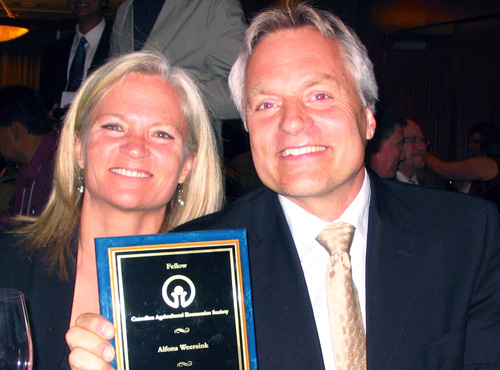Prof. Alfons Weersink, Department of Food, Agricultural and Resource Economics (FARE), was named a fellow of the Canadian Agricultural Economics Society (CAES) on May 31. Criteria for the honour include significant contributions to the agricultural economics profession and the institutions of Canadian agricultural economics.
FARE department chair Alan Ker says one external reviewer made this comment in a letter of support: “Over the past few years, I have written a letter of support for individuals selected to be fellows of the Canadian Agricultural Economics Society. In my opinion, none of these individuals deserved the honor of being selected as a fellow more than Alfons.”
Weersink has been at the University of Guelph since completing his PhD at Cornell University in 1989. He was a visiting scholar at the Food Research Institute, Stanford University, in 1995-1996; a Henry Schapper Fellow at the School of Agriculture and Resource Economics, University of Western Australia, in 2004; and a Mansholt Graduate School Fellow at Wagningen University in 2010-2011. In addition, he has been an adjunct professor at the School of Agriculture and Resource Economics, University of Western Australia, since 2010.
Among other things, Weersink’s research examines the effectiveness of agri-environmental policies. He has won several awards for his work, including recognition for outstanding articles in the Canadian Journal of Agricultural Economics and the Review of Agricultural Economics. He received the OAC Alumni Foundation Distinguished Research Award in 2006 and, more recently, honours from CAES and the Australian Agricultural and Resource Economics Society.
Of special note, says Ker, is that much of Weersink’s research has been done in conjunction with graduate students. “Alfons has supervised 10 PhD students and 36 master’s students. Most impressively, almost all of these students have produced a publication in a refereed academic journal.
“While Prof. Weersink has been a most prolific researcher, he is also one of the department’s best teachers and has always maintained a full teaching load,” adds Ker. “His overall evaluation by students has never been less than four out of five on a point scale.”
One student’s comment: “Prof. Weersink is one of the best, if not the best, instructor I have had in university. He is very approachable and teaches the course material very well. I would recommend his class to anyone who asks.”
